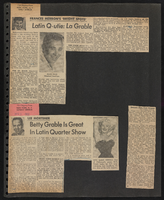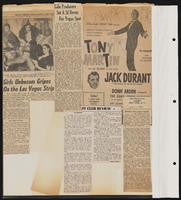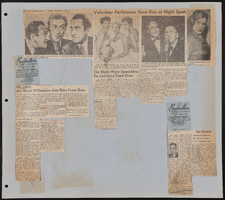Search the Special Collections and Archives Portal
Search Results
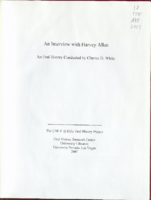
Transcript of interview with Harvey Allen by Claytee D. White, December 5, 2006
Date
Archival Collection
Description
Text
Donn Arden Photographs
Identifier
Abstract
The Donn Arden Photographs (approximately 1920-1989) contain photographs, negatives, and photographic slides of dancer and choreographer Donn Arden. The photographs primarily document Arden's life as a dancer and choreographer in Las Vegas, Nevada and in Paris, France, including performances at the Stardust Hotel, Desert Inn, and MGM Grand in Las Vegas and the Lido in Paris. The photographs also depict rehearsals, dancers, showgirls, Arden's friends and family, and performance locations.
Archival Collection

Transcript of interview with Jarmilla McMillan-Arnold by Claytee D. White, October 7, 2010
Date
Archival Collection
Description
Jarmilla McMillan-Arnold’s father, Dr. James B. McMillan, was the first black dentist in the state of Nevada. Dr. McMillan’s colleagues consisted of Dr. West, the first black medical doctor in the state, and Dr. Ice, the first black surgeon in Nevada. This interview highlights and archives the solid foundation upon which Nevada’s black community was built. Jarmilla recalls early memories of growing up as the daughter of Las Vegas NAACP president Dr. McMillan. She was born in Detroit, Michigan, to a Caucasian and Indian mother who was a professional dancer. Jarmilla’s parents separated when she was very young and as a result she was raised by her paternal grandmother who owned a restaurant in Pontiac, Michigan. Jarmilla describes her grandmother as being well-known and highly regarded in the community where she maintained her business. Jarmilla attended Catholic schools in Detroit, Pontiac, and Las Vegas. Having moved to Las Vegas with her father, Jarmilla’s narrative offers keen insigh
Text
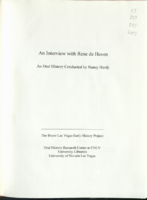
Transcript of interview with Rene De Haven by Nancy Hardy, August 2, 2003
Date
Archival Collection
Description
Text
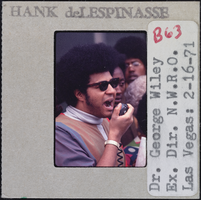
pho036445-388
Date
Archival Collection
Description
Dr. George Wiley, Executive Director National Welfare Rights Organization, Las Vegas, Nevada, February 16, 1971.
Image
Alice Key Photograph Collection
Identifier
Abstract
The Alice Key Photograph Collection (1930s-1990s) is comprised of color and black-and-white photographic prints of activist, dancer, and journalist Alice Key with family, friends, political figures, and performers. Materials include photographs of Senator Howard Cannon, Louis Armstrong, and Bill Robinson, and signed professional head shots. Also pictured are Key's coworkers and unidentified performers.
Archival Collection
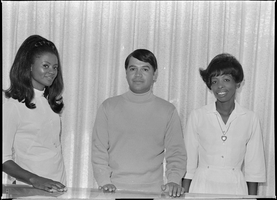
Set of photographs including a political party, beauticians, and Highland's campaign: image 010
Date
Archival Collection
Image

